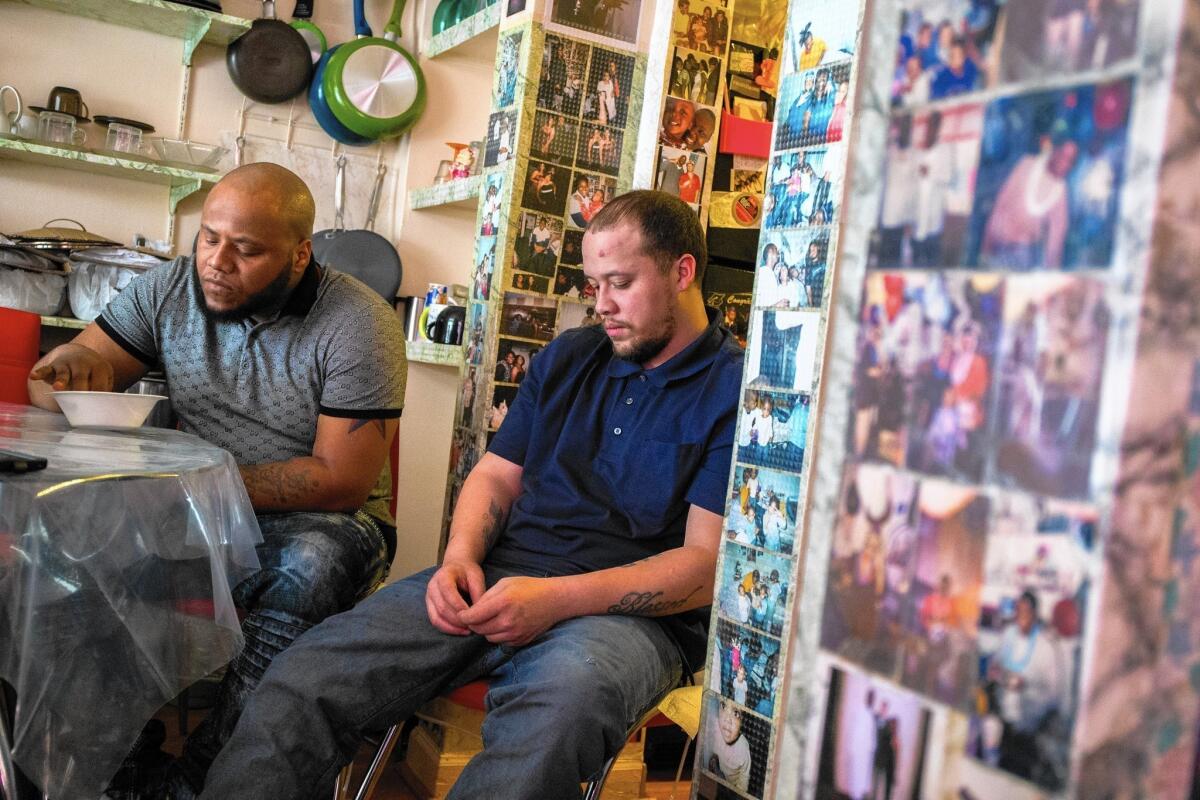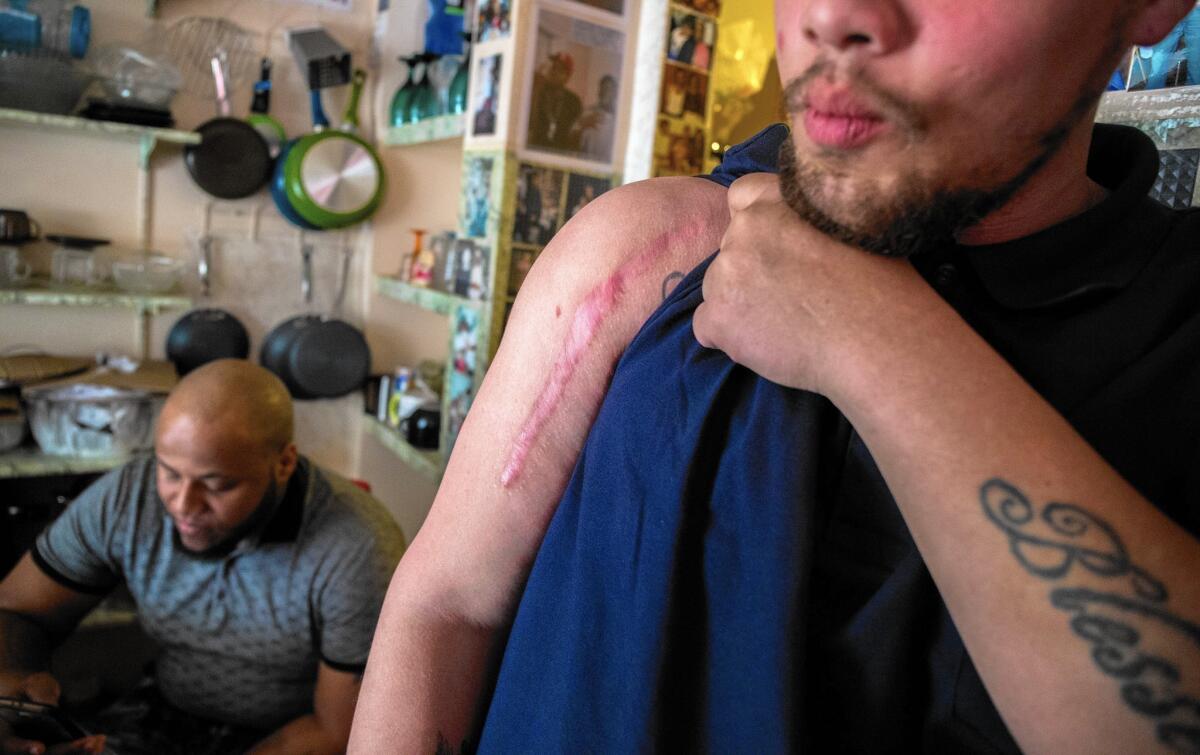Chicago brothers shot by an officer then charged with felonies are cleared of wrongdoing
- Share via
Reporting from Chicago — Dressed in a dark gray suit, a Chicago police tactical officer stood up in the witness stand, raised an imaginary gun and pointed it at a criminal defense lawyer.
Officer Wilfredo Ortiz had been asked to reenact what had happened to him while he was on patrol early on New Year’s Day 2014 when he heard gunshots and rushed to a nearby house. On a back porch, a man pointed a gun at him and refused to drop it, Ortiz testified. The veteran officer fired off 11 shots, critically injuring the man and his brother and wounding their sister inside the home. Both brothers were charged with multiple felonies.
But in a second blow for the prosecution and police in little more than a year, a Cook County judge last week acquitted Michael Williamson, 29, the man identified by Ortiz as the gunman, on aggravated assault and weapons charges, saying the officer’s story had changed on a key detail.

Brothers Michael Williamson, 29, right, and Princeton Williamson, 27, were shot in 2014 by a Chicago police officer.
Early last year, the same judge had blasted a detective’s testimony against Williamson’s brother, Princeton, and thrown out his purported admissions to police and prosecutors. With that critical evidence barred, prosecutors dropped the weapons charges against him.
Lawyers for the brothers said the cases were the result of heavy-handed efforts by police to tidy up a complex and chaotic crime scene in an attempt to limit any doubts about the officer’s actions. It demonstrates, they said, how Chicago police routinely charge those who are shot by officers to try to strengthen the justification for the officers’ actions.
“If they shoot you and you live, you’re going to be charged,” said attorney Michael Robbins, who represents both brothers in a pending federal lawsuit.
Judge James Obbish had used unusually harsh language in February 2015 when he threw out the admissions authorities said Princeton Williamson, now 27, had made.

Michael Williamson shows the scar from his shooting by a Chicago police officer.
Detective Brian Johnson had testified that Williamson, heavily sedated after undergoing emergency surgery for his gunshot wounds, had confessed from his hospital bed.
But two nurses said Williamson, on a continuous intravenous feed of morphine, had been in no condition to be interviewed. One, in fact, said she had to communicate with him by having him squeeze her hands to answer questions yes or no.
Obbish called the detective’s testimony “one of the biggest pieces of garbage I ever heard from a professional member of law enforcement.”
“I have to seriously question whether Mr. Williamson ever did anything but maybe grunt, or even knew who he was talking to,” Obbish said.
In acquitting Michael Williamson last week, the judge was far less critical of Ortiz’s testimony, describing the officer’s actions that night as “mostly reasonable.”
“If they shoot you and you live, you’re going to be charged.”
— Michael Robbins, attorney
But he found troubling that Ortiz had altered his account on a key point — how many people were on the back porch that night when he opened fire.
Ortiz told detectives that night that he’d seen four or five people on the back porch. But two days later, with a union representative and a lawyer at his side, Ortiz told the Independent Police Review Authority he saw only Michael Williamson, according to trial testimony.
“People got shot in this particular case who didn’t deserve to get shot,” a transcript quoted Obbish as saying last week from the bench at the Leighton Criminal Court Building.
Obbish called eyewitness identification “one of the weakest aspects of proof” and pointed out that prosecutors had no physical evidence that Michael Williamson fired a gun.
While finding Ortiz to be “a very credible witness,” the judge said not enough evidence implicated Williamson in what had been a chaotic scene.
“It’s kind of a fog of war [scenario],” he said.
The judge also found that prosecutors hadn’t been able to mount an attack on the defense contention that the home’s owner, Charles Lewis, had fired the gun into the air in a New Year’s celebration.
Multiple witnesses had told police that night that Lewis had also been out on the porch, but he was never questioned, his DNA was never gathered and police didn’t perform a gunshot residue test on him, the brothers’ attorneys said.
“[Police] weren’t interested because he hadn’t been shot,” said Jeffrey Neslund, another attorney for the brothers.
Lewis was shot and killed last fall in Chicago’s Englewood neighborhood.
At trial, Ortiz testified he saw Williamson holding a gun at his side, identified himself as a cop and ordered Williamson to drop the weapon.
The two men then locked eyes — Ortiz told the Independent Police Review Authority that Williamson’s eyes “lit up like a Christmas tree” — and then Williamson took a “tactical stance,” squaring his shoulders and raising the gun, the officer said. Ortiz, fearing for his life, opened fire, he testified.
“I actually thought he was going to kill me,” Ortiz said.
Michael Williamson, who at the time of the shooting was a Navy serviceman and had no criminal record, said he found Ortiz’s testimony far-fetched, particularly the officer’s claim that he could see the gun was in slide lock, and therefore had no more ammunition.
“Who takes a tactical stance and raises an unloaded gun at a police officer?” Williamson said in an interview last week.
Williamson was home to celebrate the holidays with family at the time of the shooting.
“I actually thought I was dead,” he said. “I felt myself going unconscious.”
Princeton Williamson said the indignity of being charged with a crime after being shot added insult to injury. After undergoing multiple operations and enduring two months in the hospital, he spent an additional two months in jail before making bail.
“I woke up not knowing where I was sometimes,” he said of the pain after the shooting.
Williamson and his brother sat at a table in their grandmother Msfoxie Williamson’s three-bedroom apartment, where she raised them and four other grandchildren. The walls were covered with family photos taken over decades.
As her grandchildren helped themselves to jelly beans from a container on her table, Msfoxie Williamson spoke of the anger she felt toward Chicago police.
“You shot up four of my family members,” she said in reference to another grandson who suffered a graze wound to his face on the porch and a granddaughter who was shot in the stomach as she stood in the kitchen.
After spending two years winding their way through the Cook County criminal justice system, the two brothers have differing takes on its effectiveness.
“I think they got it right with us,” Michael Williamson said. “A lot of people think the justice system is a joke, but … they do get it right sometimes.”
His younger brother shook his head in disagreement.
“I feel like we just got lucky,” Princeton Williamson said.
ALSO
Police fatally shoot burglary suspect in Boyle Heights apartment
Uncovering information about police misconduct might soon get easier in California
$28-billion L.A. County budget proposal aims to address homelessness, improve jails
More to Read
Sign up for Essential California
The most important California stories and recommendations in your inbox every morning.
You may occasionally receive promotional content from the Los Angeles Times.










